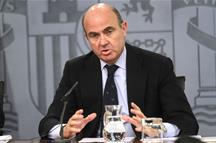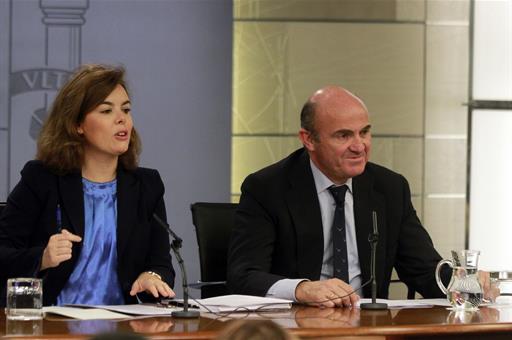Council of Ministers
Government adapts European legislation for bank bailouts not to affect taxpayers
Council of Ministers - 2014.11.28
Moncloa Palace, Madrid
The Minister for Economic Affairs and Competition, Luis de Guindos, underlined the importance of the Draft Bill on the Re-structuring and Resolution of Credit Institutions and Investment Companies approved by the Council of Ministers. This text transposes into Spanish law "a fundamental European regulation", which is one of the pillars of banking union, "the most significant step forward in the Eurozone" since its inception.
Luis de Guindos pointed out that the initiative has three main objectives: to reduce the fragmentation of credit markets, sever the link between sovereign risk and macro-economic risk and "for bank bailouts not to cost taxpayers anything".
Deposits of less than 100,000 euros are guaranteed
The Minister for Economic Affairs recalled that banking union is based on two fundamental pillars. On the one hand, the Single Supervisory Mechanism (SSM), already in operation, which corresponds to the European Central Bank; and, on the other hand, the new system of banking restructuring which this draft bill transposes to Spanish law.
Within the resolution framework for banking institutions, "before using one euro of public money" to bail out these institutions, a process to establish reductions must be implemented, pointed out Luis de Guindos. Firstly, banks' shareholders and creditors will take on losses of a value of up to 8% of the total liabilities of the institution. "Deposits of less than 100,000 euros will always be guaranteed", highlighted the minister.
 Pool MoncloaIf after these reductions there is still a shortfall, the institution will resort to the Resolution Fund, which may assume losses for a maximum amount of up to 5% of the total liabilities. The new legislation creates a National Resolution Fund, which will be funded by the banks themselves with between 5.5 and 6 billion euros, which will form part of the European Fund in a progressive manner over a period of eight years.
Pool MoncloaIf after these reductions there is still a shortfall, the institution will resort to the Resolution Fund, which may assume losses for a maximum amount of up to 5% of the total liabilities. The new legislation creates a National Resolution Fund, which will be funded by the banks themselves with between 5.5 and 6 billion euros, which will form part of the European Fund in a progressive manner over a period of eight years.
The Minister for Economic Affairs stressed that any losses greater than the sum of the aforesaid percentages have not been seen in Spain even in the most serious cases of capital injections. "Hence, what is ultimately guaranteed is that any injection of public money from the national treasury will only take place under truly exceptional circumstances", he said.
Preventive plans
Prevention is another key element of the new legislation. Each bank will have to implement a re-structuring plan, in the event that it becomes insolvent but is able to recover using its own resources, and another resolution plan, which will involve implementing the process of reductions or capital injection.
The draft law also establishes a resolution authority. In the case of Spain, it will be the Single Resolution Mechanism (Spanish acronym: MUR) for 90% of bank institutions, pointed out Luis de Guindos. For the other 10% - mainly rural savings banks - the Orderly Bank Restructuring Fund (Spanish acronym: FROB) and the Bank of Spain will be the corresponding resolution authorities.
The FROB will deal with executive resolution; the new legislation creates the figure of the president of this entity, with a non-extendable mandate of five years, who will also represent Spain on the Government MUR Board. The Bank of Spain will deal with the preventive phase, a task which will fall to the National Securities Market Commission (Spanish acronym: CNMV) in relation to investment firms.
Finally, the text amends the regulations of the Deposit Guarantee Fund to establish a minimum objective of 0.8% of the deposits covered.
PIVE 6 Plan
 Pool MoncloaThe Council of Ministers approved a Royal Decree to provide continuity to the direct granting of subsidies under the Programme to Incentivise Efficient Vehicles (PIVE 6 Plan). Private individuals, independent contractors, micro-companies and SMEs that have signed up to the plan may take advantage of this financial aid when acquiring a new vehicle.
Pool MoncloaThe Council of Ministers approved a Royal Decree to provide continuity to the direct granting of subsidies under the Programme to Incentivise Efficient Vehicles (PIVE 6 Plan). Private individuals, independent contractors, micro-companies and SMEs that have signed up to the plan may take advantage of this financial aid when acquiring a new vehicle.
The Vice-President of the Government, Soraya Sáenz de Santamaría, explained that the PIVE 6 Plan will be extended because car dealers have already used up the previous financial aid due to the success of the successive rounds of the programme among consumers. She also highlighted the positive effect of the plan in terms of "energy efficiency, the environment, road safety and economic activity".
This extension is in force as from 24 November 2014, it maintains the current requirements for obtaining a discount and includes vehicles adapted to the disabled in the subsidy plan.
PIMA Air 4 Plan
The government also approved the PIMA Air 4 Environmental Action Plan, with a provision for direct aid valued at 9.6 million euros for the acquisition of commercial vehicles, gas vehicles and electric bicycles.
 Pool MoncloaSoraya Sáenz de Santamaría pointed out that this plan is "yet one more step in the strategy of reducing pollutant emissions and strengthens the government's policies in the fight against climate change". She also commented that it allows the commercial vehicle fleet to be renewed, "which is a key driver of economic activity and helps boost an industrial activity of considerable weight in Spain".
Pool MoncloaSoraya Sáenz de Santamaría pointed out that this plan is "yet one more step in the strategy of reducing pollutant emissions and strengthens the government's policies in the fight against climate change". She also commented that it allows the commercial vehicle fleet to be renewed, "which is a key driver of economic activity and helps boost an industrial activity of considerable weight in Spain".
In the case of commercial vehicles, the Vice-President of the Government specified that beneficiaries can obtain subsidies of 1,000 euros per vehicle in the lower category of less than 2,500 kilos and of 2,000 euros for those vehicles weighing 2,500 kilos or more. Soraya Sáenz de Santamaría also explained that, in this edition of the plan, the acquisition of gas vehicles will be promoted, since this is a technology with a very low level of pollutant emissions.
Investment in new technologies
The government authorised an investment for new technologies in the administration of justice, amounting to a total of 51.2 million euros for 2015, 16 million euros higher than in 2014.
The Vice-President of the Government specified that this investment will be distributed in four action plans:
- Organisation of judicial activity, with a total investment of 2.5 million euros, of which 1.7 million will be allocated to setting up the Judicial Office.
- Technological infrastructure and judicial activity services, which will receive an allocation of 40.6 million euros and which includes strategic plans such as the Electronic Judicial File and improvements in procedural management and the Integrated Justice System on interoperability between the different public registries.
- Cooperation between judicial activity services. The total investment for this plan will amount to 5.7 million euros, of which 2.5 million correspond to the judicial scheme for interoperability and security, LEXNET, the shared data scheme, and 2.7 million euros to the integrated system of administrative registers to support judicial activity.
- Management procedures in the administration of justice. 2.2 million euros will be allocated to projects related with the Electronic Auction Portal, to be implemented by the Official State Gazette (Spanish acronym: BOE), the strategic web, judicial statistics and a dashboard.
Current affairs
 Pool MoncloaAt the press briefing following the Council of Ministers, journalists enquired after the possibility of the President of the Government, in the course of his visit this Saturday to Barcelona, announcing any positive measures for this autonomous region.
Pool MoncloaAt the press briefing following the Council of Ministers, journalists enquired after the possibility of the President of the Government, in the course of his visit this Saturday to Barcelona, announcing any positive measures for this autonomous region.
In this respect, Soraya Sáenz de Santamaría pointed out that the government "has spent the last three years making positive proposals for Catalonia and for the Regional Government of Catalonia", and thus "compensate for the shortcomings" of the government of Artur Mas. "We have ensured that Catalonia can finance itself", provide public services and maintain investments in infrastructures, such as those relating to the high-speed connection of its four provinces, the boost given to the Mediterranean Corridor project and the recent 5-million euro assistance for the Gran Teatro del Liceo.
In turn, the Minister for Economic Affairs and Competition asserted that "the measures taken by this government have had particularly beneficial results for Catalonia", where economic growth, he stated, is above the national average. "The Government of Spain behaves very well towards Catalonia, and we will continue to act there, providing support, as in other autonomous regions".
As regards the alleged delay by the government in pushing through the democratic regeneration measures debated on Thursday in the Lower House of Parliament, the Vice-President of the Government stressed that "they will be approved in this term of office". If they have not already been pushed through "it is because we are seeking consensus, particularly from the Socialist Group" since the Council of Ministers approved them in February, she explained. "This has a very important joint work base" and "nobody would understand that an agreement has not been reached for reasons of political opportunism", she added.
When asked about the differences put forward by the European Commission with respect to the macro-economic forecasts for Spain for 2015, Luis de Guindos considered that these are "insignificant" and that it will not be necessary to adopt any additional measures. "With those already contained in the Budget it will be more than enough to meet the 4% deficit target", among other reasons, he claimed, because the growth of our economy - 2% for next year - is higher than the forecast made by Brussels.





